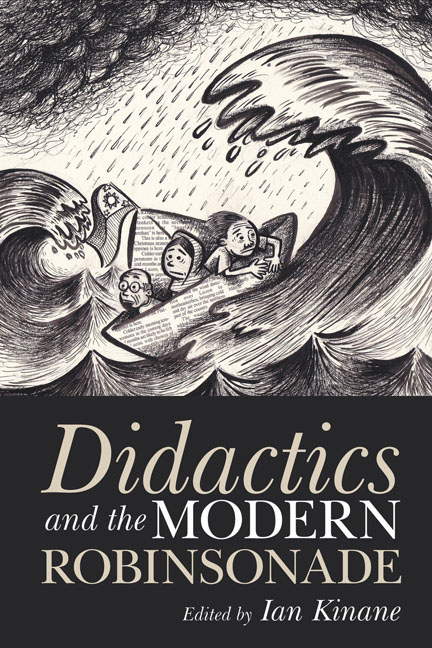Book contents
- Frontmatter
- Dedication
- Contents
- Notes on Contributors
- Foreword: The Progressive Pedagogies of the Modern Robinsonade
- Introduction: The Robinsonade Genre and the Didactic Impulse: A Reassessment
- 1 ‘What a Crusoe crowd we shall make!’: Destabilising Imperialist Attitudes to Space in G. Warren Payne's Three Boys in Antarctica
- 2 Borrowing (from) Crusoe: Library Books and Identity Formation in the Irish Free State
- 3 Navigating Nationhood, Gender, and the Robinsonade in The Dreams of Myfanwy
- 4 Call it Courage and the Survival of the Imperial Robinsonade
- 5 Shifting Perspectives in Two Mid-Twentieth-Century Robinsonades
- 6 Between Communitas and Pantheism: Terry Pratchett's Nation as a Post-Christian Robinsonade for a Postcolonial World
- 7 Romance, the Robinsonade, and the Cultivation of Adolescent Female Desire in Libba Bray's Beauty Queens
- Index
Foreword: The Progressive Pedagogies of the Modern Robinsonade
- Frontmatter
- Dedication
- Contents
- Notes on Contributors
- Foreword: The Progressive Pedagogies of the Modern Robinsonade
- Introduction: The Robinsonade Genre and the Didactic Impulse: A Reassessment
- 1 ‘What a Crusoe crowd we shall make!’: Destabilising Imperialist Attitudes to Space in G. Warren Payne's Three Boys in Antarctica
- 2 Borrowing (from) Crusoe: Library Books and Identity Formation in the Irish Free State
- 3 Navigating Nationhood, Gender, and the Robinsonade in The Dreams of Myfanwy
- 4 Call it Courage and the Survival of the Imperial Robinsonade
- 5 Shifting Perspectives in Two Mid-Twentieth-Century Robinsonades
- 6 Between Communitas and Pantheism: Terry Pratchett's Nation as a Post-Christian Robinsonade for a Postcolonial World
- 7 Romance, the Robinsonade, and the Cultivation of Adolescent Female Desire in Libba Bray's Beauty Queens
- Index
Summary
Postcolonial critics (and before them James Joyce, who saw in Crusoe ‘the true symbol of British conquest’) have rightly made it impossible to study Robinson Crusoe without considering the colonial context of a European man's conquest of an island and its neighbouring indigenous peoples. Likewise, the Robinsonade, the genre of island adventure fiction historically directed at young male readers that is Robinson Crusoe’s literary legacy, has long been implicated in both the imperialist project and in the promotion of decidedly masculine model of individualism. Narratives of island (or otherwise secluded) survival have traditionally idealised what postcolonial scholars have described as a dominating, sovereign form of subjectivity that has underwritten both colonial and capitalist enterprises. Given the usually didactic functions of Robinsonade literature (and games and toys, etc.) for young readers, this association can be particularly vexing for modern readers and educators.
The Robinsonade has, however, also proven a broad and flexible enough category over the past two and a half centuries to allow for narratives that imagine subjectivities and identities outside of triumphant, colonial individualism. As early as 1782, the radical Thomas Spence wrote Crusonia, a ‘Supplement to Robinson Crusoe’ in which he envisioned a utopian society of common land ownership developing on Crusoe’s island. Popular ballad and chapbook retellings of Crusoe's story also tended to reimagine him as an everyman whose tale of suffering and triumph served the communal functions of the folk hero. By the twentieth century, authors such as Derek Walcott (Pantomime) and J.M. Coetzee (Foe) were ‘writing back’ with Crusoe-inspired stories that contested the colonial mentality inspired by the original novel.
With their focus on too-frequently overlooked Robinsonades, often from outside the traditional colonial centre, the essays in Didactics and the Modern Robinsonade further extend the possibilities offered by the genre. As the authors in this collection ably demonstrate, the modern Robinsonade remains a vibrant genre, capable of both embracing its didactic heritage and challenging its ideological history. These stories allow young adult readers to imagine diverse experiences and to explore questions of identity in exciting, innovative ways.
- Type
- Chapter
- Information
- Didactics and the Modern RobinsonadeNew Paradigms for Young Readers, pp. xiii - xivPublisher: Liverpool University PressPrint publication year: 2019



